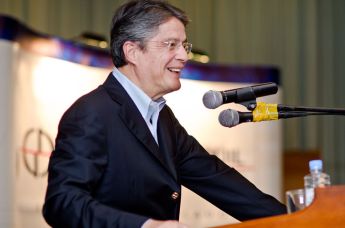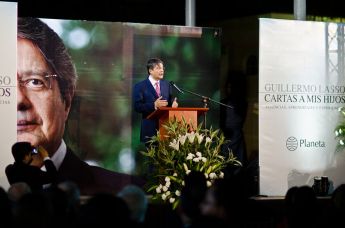
Article Artículo
The Story of Rising Inflation Is Not All It is Cracked Up to BeCEPR / March 31, 2017
Article Artículo
The Different Experiences of Black Unemployment and White UnemploymentSarah Rawlins and / March 30, 2017
Article Artículo
The Generation of Nonsense in the Boston GlobeThe main economic story of the last four decades is the massive upward redistribution of income that has taken place. The top one percent's share of national income has more than doubled over this period from roughly ten percent in the late 1970s to over twenty percent today. And, this is primarily a before-tax income story, the rich have used their control over the levers of economic power to ensure that an ever larger share of the country's wealth goes into their pockets. (Yes, this is the topic of my book, Rigged [it's free].)
Anyhow, the rich don't want people paying attention to these policies (hey, they could try to change them), so they endlessly push out nonsense stories to try to divert the public's attention from how they structured the rules to advance their interests. And, since the rich own the newspapers, they can make sure that we hear these stories.
This meant that yesterday the NYT gave us the story of how robots are taking all the jobs and driving down wages. Never mind that productivity growth is at its slowest pace in the last seven decades. Facts and data don't matter in the alternative world where we try to divert folks' attention from things like the Federal Reserve Board (who are not robots, last I checked) raising interest rates to make sure that we don't have too many jobs.
One of the other big alternative facts for the diverters is the generational story. This is the one where we tell folks to ignore all those incredibly rich people with vast amounts of money, the reason most people are not seeing rising living standards is the damn baby boomers who expect to get Social Security and Medicare, just because they paid for it. The Boston Globe gave us this story with a piece by Bruce Cannon Gibney, conveniently titled "how the baby boomers destroyed everything." (Full disclosure: I am one of those baby boomers.)
There is not much confusion about the nature of the argument, only its substance. Gibney complains about:
"...the unusual prevalence of sociopathy in an unusually large generation. How does that disorder manifest? Improvidence is reflected in low levels of savings and high levels of bankruptcy. Deceit shows up as a distaste for facts, a subject on display in everything from Enron’s quarterly reports to daily press briefings. Interpersonal failures and unbridled hostility appeared in unusually high levels of divorce and crime from the 1970s to early 1990s."
Starting with the bankruptcy story, the piece to which Gibney helpfully linked noted a doubling of bankruptcy rates for those over 65 since 1991. It reported:
"Expensive health care costs from a serious illness before a patient received Medicare and the inability to work during and after a serious illness are the prime contributors to financial crises among those 55 and older."
Yes, we have clear evidence of a moral failing here.
CEPR / March 30, 2017
report informe
Latin America and the Caribbean
¿El TLCAN ayudó a México? Una actualización 23 años despuésMark Weisbrot, Lara Merling, , and / March 29, 2017
report informe
Latin America and the Caribbean
Did NAFTA Help Mexico? An Update After 23 YearsMark Weisbrot, Lara Merling, , and / March 29, 2017
Article Artículo
Job Loss in Manufacturing: More Robot BlamingIt is striking how the media feel such an extraordinary need to blame robots and productivity growth for the recent job loss in manufacturing rather than trade. We got yet another example of this exercise in a NYT Upshot piece by Claire Cain Miller, with the title "evidence that robots are winning the race for American jobs." The piece highlights a new paper by Daron Acemoglu and Pascual Restrepo which finds that robots have a large negative impact on wages and employment.
While the paper has interesting evidence on the link between the use of robots and employment and wages, some of the claims in the piece do not follow. For example, the article asserts:
"The paper also helps explain a mystery that has been puzzling economists: why, if machines are replacing human workers, productivity hasn’t been increasing. In manufacturing, productivity has been increasing more than elsewhere — and now we see evidence of it in the employment data, too."
Actually, the paper doesn't provide any help whatsoever in solving this mystery. Productivity growth in manufacturing has almost always been more rapid than productivity growth elsewhere. Furthermore, it has been markedly slower even in manufacturing in recent years than in prior decades. According to the Bureau of Labor Statistics, productivity growth in manufacturing has averaged less than 1.2 percent annually over the last decade and less than 0.5 percent over the last five years. By comparison, productivity growth averaged 2.9 percent a year in the half century from 1950 to 2000.
CEPR / March 29, 2017

Article Artículo
Latin America and the Caribbean
Las preocupantes actividades financieras de un candidato presidencial ecuatorianoMark Weisbrot / March 27, 2017
Article Artículo
Latin America and the Caribbean
Trade Denialism Continues: Trade Really Did Kill Manufacturing JobsDean Baker
Truthout, March 27, 2017
Dean Baker / March 27, 2017
Article Artículo
Memo to the Staff of the Senate Committee on Banking, Housing and Urban AffairsMarch 27, 2017, CEPR
Dean Baker / March 27, 2017
Article Artículo
National Income Accounting for Robert Samuelson and FriendsIt would be a much better world if the people involved in economic policy debates understood basic economics. Unfortunately, such knowledge is sorely lacking in Washington.
Robert Samuelson gave us a great example of accounting ignorance in his column where he pushed the idea that the budget should be near balance when the economy is close to full employment. There is of course an important economic point; if we believe what economists thought about prime age (ages 25 to 54) labor force participation rates back before the recession, we are still around 2 million jobs below full employment.
But leaving such trivia aside, there is the accounting issue of having a balanced budget at full employment. Samuelson cites economist Herbert Stein as his authority on this point. It is important to note that Stein made this comment when our trade was much closer to balanced.
This matters because if we have a large trade deficit, it was $540 billion (around 2.9 percent of GDP) in the last quarter, then this is a reduction in domestic demand compared to a situation in which trade was balanced. This $540 billion is creating demand in Europe, Canada, China, and elsewhere , not in the United States.
With this sort of drain on demand, we have to make this up from some other source. We can pray to the god of incentivizing entrepreneurs and hope that we will get a huge investment boom, but adults don’t believe in this nonsense. Investment has moved within a fairly small range as a share of GDP over the last half century. At best, we can hope that good policy will lead to very modest gains in investment as a share of GDP – not enough to make up for a trade deficit of 2.9 percent of GDP.
CEPR / March 27, 2017
Article Artículo
New Health Care Plan: Open Source Drugs, Immigrant Doctors, and a Public OptionNow that the Republican health care plan has been sent to the dust bin of history, it’s worth thinking about how Obamacare can be improved. While the ACA was a huge step forward in extending insurance coverage, many of the complaints against the program are justified. The co-pays and deductibles can mean the plans are of little use to middle-income people with relatively low bills.
This is a great time to put forward ideas for reducing these costs and making other changes in the health care system. Obviously this congress and president are not interested in reforms that help low- and middle-income families, but the rest of us can start pushing these ideas now, with the expectation that the politicians will eventually come around.
There are two obvious directions to go to get costs down for low- and middle-income families. One is to increase taxes on the wealthy. The other is to reduce the cost of health care. The latter is likely the more promising option, especially since we have such a vast amount of waste in our system. The three obvious routes are lower prices for prescription drugs and medical equipment, reducing the pay of doctors, and savings on administrative costs from having Medicare offer an insurance plan in the exchanges.
Taking these in turn, the largest single source of savings would be reducing what we pay for prescription drugs. We will spend over $440 billion this year for drugs that would likely sell for less than $80 billion in a free market without patent monopolies and other forms of protection. If we paid as much as people in other wealthy countries for our drugs, we would save close to $200 billion a year. We spend another $50 billion a year on medical equipment which would likely cost around $15 billion in a free market.
If the government negotiated prices for drugs and medical equipment its savings could easily exceed $100 billion a year (see chapter 5 of Rigged). It could use some of these savings to finance open-source research for new drugs and medical equipment.
We already fund a huge amount of research, so this is not some radical departure from current practice. The government spends more than $32 billion on research conducted by the National Institutes of Health. It also picks up 50 percent of the industry’s research costs on orphan drugs through the Orphan Drug Tax Credit. Orphan drugs are a rapidly growing share of all drug approvals, as the industry increasingly takes advantage of this tax credit.
The big change would not be that the government was funding research, but rather the research results and patents would be in the public domain, rather than be used by Pfizer and other drug companies to get patent monopolies. As a result, the next great breakthrough drug will sell as a generic for a few hundred dollars rather than hundreds of thousands of dollars. And MRI scans would cost little more than X-rays.
CEPR / March 25, 2017

Article Artículo
Latin America and the Caribbean
A Presidential Candidate Proposes a Tax Change That Would Give Him Millions of Dollars – Should That Be Part of the News?Mark Weisbrot / March 24, 2017

Article Artículo
Latin America and the Caribbean
Ecuadorian Candidate Guillermo Lasso: Financial Assets and Political LiabilitiesJake Johnston / March 24, 2017
Article Artículo
Marketplace Radio Has Not Heard About the Productivity SlowdownCEPR / March 24, 2017

Article Artículo
Latin America and the Caribbean
The Troubling Financial Activities of an Ecuadorian Presidential CandidateMark Weisbrot / March 23, 2017
Article Artículo
George Will's Dream Health Insurance Reform: Policies for Cancer Patients that Cost $200,000 a YearCEPR / March 23, 2017
Article Artículo
Requiring Essential Health Benefits in Insurance Plans Is Part of Getting the Healthy to Subsidize the Less HealthyCEPR / March 23, 2017
Article Artículo
Latin America and the Caribbean
New Report: Sexual Exploitation and Abuse at the Hands of the UN in HaitiJake Johnston / March 22, 2017
Article Artículo
Latin America and the Caribbean
Elecciones en el Ecuador: Por qué la soberanía nacional importaMark Weisbrot / March 21, 2017